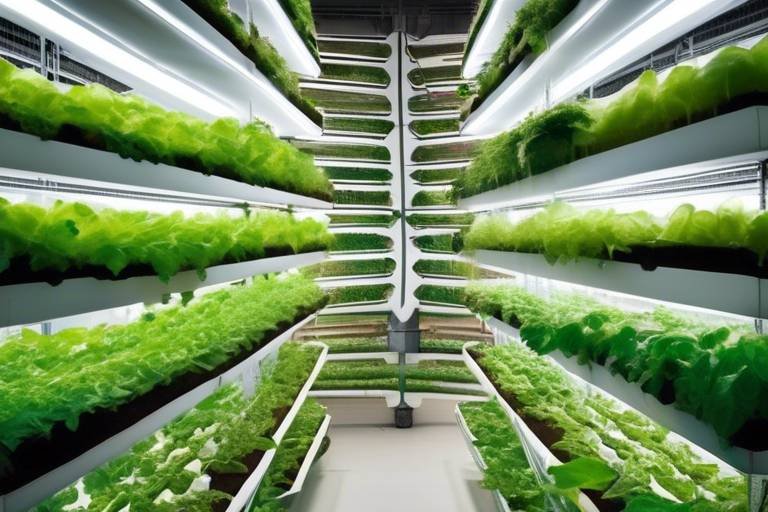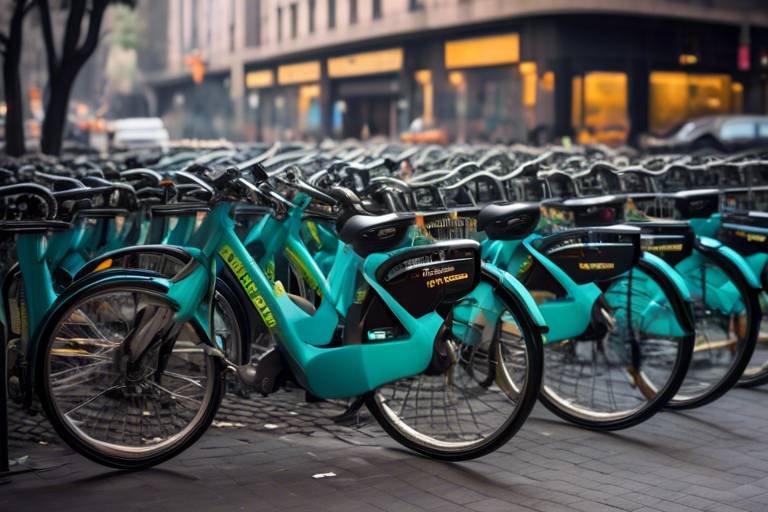Strategies to Increase Recycling in Urban Areas
In today's rapidly urbanizing world, the importance of recycling cannot be overstated. With cities bursting at the seams, the waste generated is at an all-time high, and without effective recycling strategies, our landfills are becoming overrun. So, how do we tackle this pressing issue? The answer lies in a multifaceted approach that combines community engagement, education, policy initiatives, and innovative technologies. By implementing these strategies, urban areas can not only boost their recycling rates but also foster a sustainable culture that benefits everyone.
Engaging local communities is crucial for successful recycling programs. Imagine a neighborhood where everyone is excited about recycling—where residents take pride in their efforts and encourage each other to participate. This is achievable through various community initiatives that can foster a culture of recycling. For instance, organizing neighborhood clean-up days can serve as both a fun community event and an educational opportunity. Residents can come together to clean up local parks while learning about what can and cannot be recycled, creating a sense of community ownership.
Additionally, creating recycling clubs can provide a platform for residents to share tips, strategies, and even challenges they face in recycling. By fostering discussions and sharing success stories, these clubs can motivate others to get involved. This sense of community can transform recycling from a mundane task into a collective mission that everyone feels invested in.
Education plays a vital role in improving recycling habits. Without proper knowledge about what can be recycled and how to do it, even the most well-intentioned residents may struggle to participate effectively. Informative campaigns and workshops can make a significant difference. For example, cities can host events that provide hands-on demonstrations of sorting recyclables, which can clarify common misconceptions. Imagine a workshop where participants get to practice sorting waste—this can be a fun and memorable way to learn!
Integrating recycling education into school curriculums can instill good habits early on. Teaching children about the benefits of recycling and sustainability not only empowers them but also encourages them to influence their families. Schools can create fun projects that involve recycling, such as art projects made from recycled materials or school-wide recycling competitions. These initiatives can create a ripple effect, spreading awareness beyond the classroom and into the community.
Offering workshops for adults can enhance community knowledge and participation. These workshops can cover a range of topics, from understanding local recycling guidelines to DIY projects using recycled materials. By providing a relaxed and informative environment, adults can feel more comfortable asking questions and sharing their own experiences. The potential impact on local recycling efforts can be significant, as participants leave with both knowledge and enthusiasm to spread the word.
Utilizing digital platforms to provide accessible information can significantly boost awareness. Websites and social media can serve as powerful tools for educating residents about recycling processes and guidelines. For example, creating engaging infographics that outline what can be recycled can catch the eye and make the information easier to digest. Moreover, interactive apps can help residents track their recycling habits and set goals, making the process more engaging and rewarding.
Collaborating with businesses can amplify recycling efforts. By working together, municipalities and local businesses can create programs that encourage recycling. For instance, businesses can offer discounts to customers who bring in their recyclable items or participate in recycling events. These partnerships not only increase recycling rates but also foster a sense of community responsibility among local businesses, making sustainability a shared goal.
Effective policies are essential for creating a supportive recycling environment. Without the right legislative measures in place, even the best community initiatives can fall flat. Cities can implement policies that require businesses to adhere to recycling standards, ensuring compliance and promoting responsible waste management.
Incentive programs can motivate residents to recycle more. For example, offering tax breaks or rewards for households that show consistent recycling habits can encourage sustainable behaviors. Imagine a system where residents earn points for recycling, which they can then redeem for local discounts or community benefits. This not only incentivizes recycling but also builds a stronger connection between residents and their community.
Enforcement is key to ensuring compliance with recycling regulations. Monitoring systems can be established to track recycling rates and identify areas for improvement. Penalties for non-compliance can serve as a deterrent, while education on the importance of recycling can help foster a culture of compliance. Ultimately, the goal is to create an environment where recycling becomes a natural part of daily life.
- What can I recycle in my city? - Each city has its own guidelines, so it's essential to check your local waste management website for specifics.
- How can I get involved in community recycling initiatives? - Look for local events, join recycling clubs, or volunteer with organizations focused on sustainability.
- Are there any incentives for recycling? - Many cities offer rewards programs or tax incentives to encourage residents to recycle more.

Community Engagement Initiatives
Engaging local communities is crucial for successful recycling programs. When people feel a sense of ownership and responsibility towards their environment, they are more likely to participate actively in recycling initiatives. One effective way to stimulate this engagement is through community events that promote recycling awareness and participation. Imagine a neighborhood block party where residents are encouraged to bring their recyclables; not only does this create a fun atmosphere, but it also fosters a sense of community and collective responsibility. These events can feature interactive booths, games for children, and informative sessions that explain the importance of recycling.
Moreover, establishing neighborhood recycling champions can significantly boost participation. These champions, who are passionate about recycling, can lead by example and motivate their neighbors through personal stories and shared experiences. They can organize regular clean-up drives, recycling challenges, and even friendly competitions to see which block can recycle the most. It’s a great way to turn recycling into a community sport, making it fun and engaging for everyone involved.
Another innovative approach is to create community recycling hubs. These hubs serve as central points where residents can drop off their recyclables, learn about proper recycling practices, and access educational materials. By placing these hubs in easily accessible locations, such as parks or community centers, you can remove barriers to participation. Imagine walking your dog and dropping off a few bottles at the hub—convenience is key! Additionally, these hubs can host workshops and demonstrations, further enhancing community knowledge and involvement.
To ensure these initiatives reach a broader audience, leveraging social media platforms is essential. Communities can create dedicated pages or groups where they share tips, success stories, and upcoming events related to recycling. This digital engagement not only informs but also inspires residents to take action. Picture a vibrant online community where members celebrate their recycling successes, share photos of what they’ve recycled, and challenge each other to do better. It’s all about building a supportive network that encourages sustainable practices.
Finally, partnerships with local organizations and schools can amplify these efforts. Collaborating with non-profits that focus on environmental education can provide additional resources and expertise. Schools can also play a pivotal role by integrating recycling initiatives into their curriculum, encouraging students to engage their families in recycling at home. When children learn about the importance of recycling, they often become advocates for change within their households, creating a ripple effect that can lead to substantial improvements in recycling rates.

Educational Programs
Education plays a vital role in improving recycling habits among urban residents. By providing residents with the right knowledge and tools, communities can foster a culture that prioritizes sustainability. Informative campaigns, workshops, and school-based programs are essential in teaching individuals about proper recycling practices and the broader environmental impacts of their actions. Imagine a community where every resident understands not only what can be recycled but also why it matters. This kind of awareness can lead to substantial increases in recycling rates, turning simple actions into powerful movements for change.
One effective way to enhance recycling education is through school-based programs. By integrating recycling education into school curriculums, we can instill good habits early on. Children are incredibly impressionable, and teaching them about the benefits of recycling and sustainability can shape their behaviors for life. Schools can incorporate fun and engaging activities, such as recycling competitions or eco-clubs, where students can actively participate in recycling initiatives. This hands-on approach not only makes learning enjoyable but also empowers students to become advocates for recycling within their families and communities.
In addition to school programs, workshops for adults can significantly enhance community knowledge and participation. These workshops can cover a range of topics, from understanding local recycling rules to creative ways to upcycle materials. For instance, hosting a workshop on how to turn old clothes into reusable bags not only teaches recycling principles but also promotes creativity and resourcefulness. The format of these workshops can vary; they can be in-person gatherings, webinars, or even community events where people can come together to learn and share ideas. The key is to create an inviting atmosphere that encourages open dialogue and questions.
Moreover, the digital age has opened up new avenues for education through online resources and tools. Utilizing digital platforms to provide accessible information can significantly boost awareness and understanding of recycling processes. Websites, social media campaigns, and mobile apps can serve as powerful tools for educating residents about what can be recycled, how to do it properly, and the environmental benefits of recycling. For example, an interactive app that allows users to scan items to check if they are recyclable can make the process more engaging and user-friendly. By making information readily available and easy to digest, we can empower residents to take action.
Lastly, partnerships with local businesses can amplify the impact of educational programs. Collaborating with businesses can lead to joint initiatives that promote recycling and sustainability. For instance, a local grocery store could host a recycling awareness day, offering discounts to customers who bring in recyclable materials. These partnerships not only enhance community involvement but also create a sense of shared responsibility for environmental stewardship. When businesses take an active role in education, it sends a strong message that recycling is a priority for everyone.
In summary, educational programs are crucial for increasing recycling rates in urban areas. By engaging schools, offering workshops, utilizing online resources, and partnering with local businesses, communities can create a robust framework for promoting recycling. The more informed residents are, the more likely they are to participate actively in recycling efforts, ultimately leading to a more sustainable future.
- Why is education important for recycling? Education helps individuals understand the benefits of recycling and how to do it correctly, leading to increased participation and better recycling rates.
- How can schools contribute to recycling efforts? Schools can integrate recycling education into their curriculums and engage students in hands-on activities that promote sustainable practices.
- What types of workshops can be offered for adults? Workshops can cover various topics, including local recycling rules, creative upcycling projects, and practical tips for reducing waste.
- How can technology aid in recycling education? Digital platforms can provide accessible information and tools, such as apps that help users identify recyclable materials.
- What role do businesses play in promoting recycling? Local businesses can collaborate on initiatives that raise awareness and incentivize recycling, creating a community-wide effort.

School-Based Education
Integrating recycling education into school curriculums is one of the most effective ways to instill sustainable habits in the younger generation. Imagine a world where children grow up understanding the importance of recycling, not just as a chore but as a vital part of their responsibility towards the planet. Schools are the perfect platform for this transformation, as they can reach a large number of students and create a ripple effect that extends into families and communities.
To kickstart these educational initiatives, schools can implement interactive programs that engage students through hands-on activities. For instance, organizing recycling drives or competitions can ignite a sense of enthusiasm and friendly rivalry among students. These events not only make recycling fun but also foster teamwork and community spirit. Furthermore, integrating lessons about the environmental impact of waste and the benefits of recycling can help students grasp the real-world implications of their actions.
Teachers can utilize various resources to make recycling education more impactful. For example, incorporating multimedia presentations, documentaries, and guest speakers from local environmental organizations can provide students with diverse perspectives on sustainability. Additionally, creating a designated recycling club within the school can encourage students to take initiative and lead projects that promote recycling within the school and the surrounding community.
Here’s a quick overview of some effective methods for teaching children about recycling:
- Interactive Workshops: Conducting hands-on workshops where students can learn how to sort waste correctly can significantly enhance their understanding.
- Field Trips: Organizing visits to recycling centers can provide students with a behind-the-scenes look at the recycling process, making it more tangible and real.
- Creative Projects: Encouraging students to create art or projects from recycled materials can unleash their creativity while reinforcing the value of reusing items.
Moreover, incorporating recycling education into subjects like science and social studies can provide a broader context for students. For instance, discussing the lifecycle of materials in science class can help them understand the concept of sustainability in a practical way. In social studies, students can explore how different cultures approach waste management and recycling, fostering a global perspective on environmental responsibility.
Ultimately, the goal of school-based recycling education is to create a generation that not only understands the importance of recycling but actively participates in it. By making recycling a fundamental part of education, we can empower students to become advocates for sustainability, influencing their peers and families to adopt similar practices. This kind of educational foundation can lead to a significant increase in recycling rates, ultimately benefiting our urban environments and the planet as a whole.

Workshops for Adults
Workshops for adults are a fantastic way to deepen community knowledge about recycling and to encourage active participation in sustainability efforts. Think of these workshops as a bridge connecting information to action, where residents can learn not just the "how," but also the "why" behind recycling practices. By creating an engaging environment, these sessions can transform recycling from a mundane task into a meaningful community activity.
One effective approach is to host interactive workshops that include hands-on activities. For instance, participants can learn to sort recyclables correctly by engaging in fun sorting games. This not only makes the learning process enjoyable but also reinforces the importance of proper recycling practices. Imagine a scenario where adults are divided into teams, racing against the clock to sort materials into the right bins. This kind of friendly competition can spark interest and motivate attendees to take what they've learned back to their homes.
Moreover, workshops can cover a variety of topics tailored to the interests and needs of the community. Some potential themes could include:
- Understanding Local Recycling Guidelines: Many people are unaware of what can and cannot be recycled in their area. Workshops can provide clarity and help demystify local regulations.
- Creative Upcycling Projects: Teaching adults how to repurpose items can inspire them to think creatively about waste and encourage a more sustainable lifestyle.
- Composting Basics: Many adults may be interested in composting but unsure where to start. Workshops can guide them through the process, making it accessible and manageable.
To maximize participation, these workshops can be held at various community locations such as libraries, community centers, or even parks. Offering flexible scheduling options, including evenings or weekends, can also help accommodate different work schedules and increase attendance. Additionally, providing refreshments or incentives, like giveaways or discounts at local eco-friendly businesses, can further entice residents to join.
Feedback is crucial in refining these workshops. After each session, gathering participant input can help organizers understand what worked well and what could be improved. This iterative process not only enhances future workshops but also fosters a sense of community ownership over recycling initiatives.
In summary, workshops for adults can be an invaluable tool in promoting recycling efforts within urban areas. By creating engaging, informative, and interactive experiences, communities can empower residents to take action, leading to higher recycling rates and a more sustainable future.
Q: How long do the workshops typically last?
A: Most workshops last between 1 to 2 hours, depending on the topic and the level of interaction.
Q: Are there any costs associated with attending the workshops?
A: Many community workshops are free, but some may have a nominal fee to cover materials or refreshments. Always check the event details for specific information.
Q: Can I suggest a topic for a workshop?
A: Absolutely! Community feedback is encouraged, and suggestions for future workshop topics are always welcome.
Q: What should I bring to the workshop?
A: Just bring yourself! If there are specific materials needed, that will be communicated in advance. Otherwise, come ready to learn and engage!

Online Resources and Tools
In today's digital age, the internet serves as a powerful ally in promoting recycling initiatives. can play a pivotal role in enhancing public understanding and participation in recycling programs. Imagine having a treasure trove of information at your fingertips, where you can access guidelines, tips, and community resources with just a few clicks! This accessibility can significantly boost awareness and motivate residents to engage in sustainable practices.
One of the most effective ways to utilize online platforms is through interactive websites that provide comprehensive recycling information tailored to local needs. For instance, cities can create dedicated recycling portals that offer:
- Local Recycling Guidelines: Detailed instructions on what can and cannot be recycled in specific areas, which can vary widely.
- Collection Schedules: Information on when and where to put out recyclables, ensuring that residents don’t miss collection days.
- Drop-off Locations: Maps and addresses of recycling centers for items that cannot be collected curbside.
Additionally, social media platforms can be leveraged to spread awareness and engage the community. Cities can run campaigns on platforms like Facebook, Twitter, and Instagram to share success stories, recycling tips, and upcoming events. These platforms allow for quick dissemination of information and can create a sense of community around recycling efforts.
Furthermore, mobile applications are emerging as a fantastic tool for recycling education. Imagine an app that not only reminds you of collection days but also provides a recycling calculator to track your contributions! Users can input their recycling habits, receive feedback, and even compare their efforts with friends or neighbors. This gamification of recycling can lead to increased participation and a friendly competition that fosters a culture of sustainability.
Another innovative approach is the use of online workshops and webinars. These virtual events can educate residents on the importance of recycling, the impact of waste on the environment, and practical tips for effective recycling at home. By making these sessions accessible, cities can engage a broader audience, including those who may not attend in-person events due to time constraints or mobility issues.
In conclusion, the potential of online resources and tools to enhance recycling efforts in urban areas is immense. By utilizing interactive websites, social media, mobile apps, and online educational platforms, communities can foster a culture of recycling that is informed, engaged, and proactive. The digital world provides us with opportunities that can turn the tide on waste management and significantly contribute to a more sustainable future.
Q1: How can I find out what can be recycled in my area?
A1: Most cities have dedicated recycling websites that provide detailed guidelines on what materials are accepted for recycling. You can also check with your local waste management department.
Q2: Are there any mobile apps that can help with recycling?
A2: Yes! Many cities have developed mobile apps that offer reminders for collection days, tips for recycling, and even gamified features to encourage participation.
Q3: How can I get involved in local recycling initiatives?
A3: Look for community events, workshops, or volunteer opportunities related to recycling. You can also engage with local organizations or social media groups focused on sustainability.
Q4: What should I do if I have items that are not accepted in curbside recycling?
A4: Check your local recycling website for drop-off locations or special collection events for items that cannot be recycled curbside.

Partnerships with Local Businesses
In the quest to enhance recycling rates in urban areas, forging is a powerful strategy that can yield significant results. Businesses are often seen as key players in the community, and their involvement can create a ripple effect that encourages more residents to participate in recycling initiatives. By collaborating with local enterprises, cities can tap into their resources, networks, and influence, ultimately fostering a culture of sustainability.
One way businesses can contribute is by implementing recycling programs within their operations. For instance, restaurants can set up designated recycling bins for customers, while offices can adopt a comprehensive recycling policy for paper, plastics, and electronics. This not only reduces waste but also sets a positive example for the community. When businesses actively promote recycling, they send a clear message that sustainability is a priority, encouraging customers and employees alike to follow suit.
Moreover, local businesses can serve as educational hubs for recycling practices. Hosting workshops or informational sessions about proper recycling techniques can empower residents with the knowledge they need to recycle effectively. For example, a local grocery store might offer a workshop on how to sort recyclables correctly, which can demystify the process for many individuals. These educational efforts can also extend to promotional campaigns where businesses highlight the importance of recycling through their marketing materials, further raising awareness.
Another innovative approach is to create incentive programs that reward customers for recycling. Businesses can offer discounts or loyalty points to customers who bring in recyclable materials. This not only encourages recycling but also drives traffic to the business, creating a win-win situation. Additionally, businesses can partner with local governments to sponsor community recycling events or clean-up days, showcasing their commitment to environmental stewardship and engaging the community in a hands-on manner.
To illustrate the impact of such partnerships, consider the following table that highlights successful collaborations between local businesses and cities:
| Business Name | Partnership Initiative | Outcome |
|---|---|---|
| Green Grocer | Recycling Workshops | Increased community participation by 40% |
| Café Eco | Discounts for Recyclables | Boosted customer loyalty and reduced waste by 25% |
| Tech Store | Electronics Recycling Drive | Collected over 500 pounds of e-waste |
These examples demonstrate that when local businesses take an active role in promoting recycling, they can significantly influence community behavior. By leveraging their platforms and resources, they can help create a more sustainable urban environment. Ultimately, partnerships between businesses and communities not only enhance recycling rates but also strengthen local ties and promote a shared commitment to environmental responsibility.
Q: How can local businesses get involved in recycling initiatives?
A: Local businesses can get involved by implementing recycling programs, hosting educational workshops, and creating incentive programs for customers who recycle.
Q: What are the benefits of partnerships between businesses and local governments?
A: These partnerships can enhance community engagement, increase recycling rates, and promote a culture of sustainability, benefiting both the environment and local economies.
Q: Can small businesses also make a significant impact on recycling efforts?
A: Absolutely! Small businesses can contribute by adopting sustainable practices, educating their customers, and participating in community recycling events.

Policy and Legislation
Effective policies are essential for creating a supportive recycling environment in urban areas. Without a solid legislative framework, even the most innovative recycling programs can falter. This is where local governments come into play, crafting regulations that not only promote recycling but also ensure compliance among residents and businesses. Imagine a city bustling with activity, where every household is not just a consumer but also a contributor to sustainability. Sounds ideal, right? Well, it can be achieved through well-thought-out policies.
One of the key components of effective recycling legislation is the establishment of clear guidelines. These guidelines inform residents about what can and cannot be recycled, reducing confusion and contamination in recycling bins. For instance, many people are unaware that items like pizza boxes or greasy containers can’t be recycled. By providing straightforward rules, cities can significantly improve their recycling rates.
Additionally, incentive programs can be a game-changer. These programs can take many forms, such as:
- Tax breaks for households that consistently recycle.
- Reward systems that offer points or discounts at local businesses for recycling participation.
- Community competitions that encourage neighborhoods to recycle more, with prizes for the winners.
Such incentives not only motivate residents to recycle but also foster a sense of community and competition, making recycling a fun and engaging activity.
Moreover, the enforcement of recycling laws is crucial for maintaining high compliance rates. It’s not enough to simply have rules in place; there must be mechanisms for monitoring and penalties for non-compliance. For example, cities can implement regular audits of recycling practices, and those who fail to comply could face fines or additional fees. This kind of enforcement serves as a reminder that recycling is not just a personal choice but a civic responsibility.
To illustrate the impact of effective policy and legislation, consider the following table that highlights some successful cities and their recycling initiatives:
| City | Policy/Program | Recycling Rate Improvement |
|---|---|---|
| San Francisco | Mandatory recycling and composting | Over 80% |
| Seattle | Pay-as-you-throw system | 55% to 60% |
| Toronto | Blue Bin Program | 53% to 70% |
As we can see, cities that implement robust policies and programs often experience significant improvements in their recycling rates. This not only benefits the environment but also promotes a culture of sustainability within the community. It’s a win-win situation! By prioritizing recycling through legislation, urban areas can pave the way for a cleaner, greener future.
Q: What are the most common materials that can be recycled?
A: Commonly recycled materials include paper, cardboard, glass, plastics (with recycling symbols #1 and #2), and metals like aluminum and tin.
Q: How can I find out what my local recycling rules are?
A: Most cities have official websites that outline their recycling guidelines. You can also contact your local waste management department for specifics.
Q: Are there penalties for not recycling in my city?
A: Yes, many cities have implemented fines or fees for non-compliance with recycling laws, so it's important to stay informed about your local regulations.
Q: How can I get involved in local recycling initiatives?
A: Look for community groups focused on sustainability, attend local government meetings, or volunteer for clean-up events. Your participation can make a difference!

Incentive Programs
Incentive programs are a powerful tool for motivating residents to increase their recycling efforts. Imagine living in a community where recycling not only helps the planet but also rewards you with tangible benefits. This concept is gaining traction in urban areas, where local governments and organizations are creating programs designed to encourage sustainable behaviors. These programs can take many forms, from financial incentives to community recognition, and they play a crucial role in fostering a culture of recycling.
One of the most effective types of incentive programs is the financial reward system. This could involve cash rebates for households that consistently recycle or discounts on utility bills for those who actively participate in recycling initiatives. For example, a city might implement a program where residents receive a small payment for each pound of recyclable material they collect. Such initiatives not only motivate individuals to recycle more but also create a sense of community as neighbors compete to see who can recycle the most.
Another innovative approach is the use of points-based systems. Residents can earn points for recycling, which can then be redeemed for various rewards, such as gift cards to local businesses, discounts at community events, or even tickets to local attractions. This not only encourages recycling but also supports local economies, creating a win-win situation. Imagine collecting points for doing something as simple as sorting your waste! It's like a game where everyone wins.
Incentive programs also extend beyond individual households; they can include businesses and organizations as well. For instance, local governments can partner with businesses to create a recycling competition. The business that recycles the most materials in a given period could receive tax breaks or public recognition. This not only boosts recycling rates but also encourages businesses to adopt more sustainable practices, ultimately benefiting the entire community.
However, it's essential to ensure that these programs are well-communicated and accessible to all residents. Public awareness campaigns can help spread the word about available incentives, ensuring that everyone understands how to participate and benefit. Utilizing various communication channels, such as social media, community newsletters, and local events, can significantly enhance participation rates.
To illustrate the impact of these programs, consider the following table that outlines some successful incentive initiatives from various urban areas:
| City | Incentive Program | Impact |
|---|---|---|
| San Francisco | Cash rebates for recycling | Increased recycling rates by 30% |
| Seattle | Points-based rewards system | Boosted participation in recycling by 40% |
| New York City | Business recycling competition | Enhanced recycling efforts among local businesses by 25% |
As we can see, the implementation of these incentive programs not only encourages recycling but also fosters a sense of community and collaboration among residents and businesses. By creating a system where everyone benefits from their efforts, we can significantly enhance recycling rates in urban areas. The key takeaway is that when people feel rewarded for their actions, they are more likely to engage in positive behaviors, such as recycling.
- What types of incentives can motivate residents to recycle? Financial rewards, points-based systems, and community recognition are effective incentives.
- How can businesses participate in recycling programs? Businesses can engage in competitions and partnerships with local governments to enhance their recycling efforts.
- Are incentive programs effective in increasing recycling rates? Yes, many cities have reported significant increases in recycling rates after implementing such programs.

Enforcement of Recycling Laws
Enforcing recycling laws is a critical component in achieving high recycling rates in urban areas. Without proper enforcement, even the most well-designed recycling programs can fall flat. Think of it like a traffic light: if no one is watching, people will run the red lights, and chaos ensues. Similarly, when recycling regulations lack enforcement, residents may not feel compelled to follow the rules, leading to increased waste and decreased recycling rates.
One effective strategy for enforcement is the implementation of regular audits and monitoring systems. These systems can help identify areas where recycling compliance is low. Local authorities can conduct surprise inspections of recycling bins and waste collection sites to ensure that residents are correctly sorting their recyclables. Additionally, using technology such as smart bins equipped with sensors can provide real-time data on recycling habits, allowing cities to tailor their enforcement strategies effectively.
Moreover, penalties can serve as a deterrent for non-compliance. For instance, municipalities can impose fines for residents who repeatedly fail to recycle correctly. However, it’s important to strike a balance between penalties and education. Instead of immediately resorting to fines, cities might consider a tiered approach where first-time offenders receive a warning and educational materials about proper recycling practices. This not only encourages compliance but also fosters a culture of understanding and respect for recycling laws.
Another crucial aspect of enforcement is community involvement. Engaging local residents in the enforcement process can create a sense of ownership and responsibility towards recycling initiatives. For example, neighborhood watch groups can be encouraged to report recycling violations, creating a community-driven approach to enforcement. This method not only increases compliance but also strengthens community bonds as residents work together towards a common goal.
To further enhance compliance, cities can also promote transparency in their enforcement processes. Sharing data about recycling rates and violations publicly can motivate residents to improve their recycling habits. When people see that their neighbors are complying and that the community is making progress, they are more likely to join in. A simple infographic or report published on a city’s website can go a long way in keeping everyone informed and engaged.
In summary, effective enforcement of recycling laws requires a multifaceted approach that combines monitoring, penalties, community involvement, and transparency. By fostering a culture of accountability and education, urban areas can significantly improve their recycling rates and contribute to a more sustainable future.
- What happens if I don’t recycle?
Not recycling can lead to fines, but more importantly, it contributes to environmental degradation and increased landfill waste.
- How can I report recycling violations in my community?
Most municipalities have a hotline or online portal where residents can report recycling violations anonymously.
- Are there any rewards for recycling in my city?
Many cities have incentive programs that offer rewards such as discounts on utility bills or local business coupons for residents who consistently recycle.
Frequently Asked Questions
- What are some effective ways to engage the community in recycling efforts?
Engaging the community can be achieved through various initiatives such as local clean-up events, recycling competitions, and informational workshops. These activities not only raise awareness but also foster a sense of community and shared responsibility towards the environment.
- How can educational programs improve recycling rates?
Educational programs play a crucial role in shaping recycling habits. By informing residents about what can and cannot be recycled, as well as the environmental impact of recycling, these programs can significantly increase participation. Workshops, school curriculums, and online resources are all effective methods to spread this knowledge.
- Why is school-based education important for recycling?
Integrating recycling education into school curriculums helps instill good habits from a young age. Children who learn about the importance of recycling early on are more likely to carry these practices into adulthood, creating a more sustainable future.
- What types of incentives can encourage recycling in urban areas?
Incentive programs such as tax breaks, reward points, or discounts on utility bills can motivate residents to recycle more. These incentives not only encourage participation but also make recycling a more appealing choice for individuals and families.
- How can local businesses contribute to recycling initiatives?
Local businesses can play a significant role in recycling efforts by partnering with community programs, providing recycling bins, or hosting educational events. Collaboration can amplify the impact of recycling initiatives and engage more residents in sustainable practices.
- What are the consequences of not adhering to recycling laws?
Failure to comply with recycling regulations can lead to penalties such as fines or increased waste disposal fees. Enforcement of these laws is essential to maintain high recycling rates and ensure that everyone is doing their part in contributing to a sustainable environment.



















